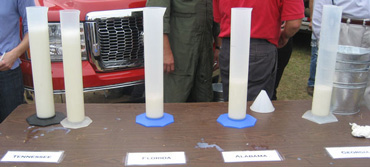The Ohio Department of Agriculture (ODA) held a forum yesterday to hear comments on milk and dairy product labeling from farmers and consumers. ODA Director Robert Boggs will consider Tuesday’s comments in deciding how the department will address such labels.
The meeting, which drew 75 people, was called after the Pennsylvania Department of Agriculture (PDA) last month sent warning letters to dairies with product labels deemed false or misleading. Those warnings prompted an estimated 25 to 35 calls and e-mails to the Ohio Department of Agriculture about this state’s policies.
The PDA’s letters pertained to so-called “absence labeling” — telling consumers what isn’t in milk, such as antibiotics, instead of what is.
At issue during much of Tuesday’s testimony was recombinant bovine somatotropin (rbST). Stan Carmony, a Wayne County dairy farmer who uses rbST, held up two gallons of milk his wife had purchased at the grocery store. One gallon of “regular” milk cost $2.98; the other, which was labeled as “rbST-free,” cost $4.18.
The cost difference “is pretty hard to swallow,” Carmony said, noting that farmers who sell their milk as a commodity pocket only a tiny fraction of that premium. Cooperatives that market dairy farmers’ milk in recent months have told them they must stop using rbST because the market for milk from treated cows is dwindling.
Carmony said he’s been told he must agree by Dec. 31 not to use rbST or his milk will no longer be picked up. He feels the consumer and farmer are losing out, and that processors and retailers are profiting. But Carol Goland of the Ohio Ecological Food and Farm Association said there are “social reasons” consumers want milk from untreated cows, saying they associate rbST-treated cows with “a certain kind of agricultural structure.”

 While yeast is a common ingredient in feed rations, including yeast in silage can cause stability issues, particularly when there is significant variability in the corn crop, says Dr. Bill Mahanna, coordinator of global nutritional services for Pioneer Hi-Bred. An increasing amount of yeast can impact digestibility and palatability of the silage, but more importantly yeast can “heat up” the silage. Mahanna shares silage management practices to help minimize the growth of yeast.
While yeast is a common ingredient in feed rations, including yeast in silage can cause stability issues, particularly when there is significant variability in the corn crop, says Dr. Bill Mahanna, coordinator of global nutritional services for Pioneer Hi-Bred. An increasing amount of yeast can impact digestibility and palatability of the silage, but more importantly yeast can “heat up” the silage. Mahanna shares silage management practices to help minimize the growth of yeast.

 Dairy Markets Week in Review
Dairy Markets Week in Review The agriculture commissioners from four states were on hand and hands-on at the Sunbelt Ag Expo in Moultrie, Georgia last month for the second Commissioner’s Milking Contest – which was a whole lot of fun.
The agriculture commissioners from four states were on hand and hands-on at the Sunbelt Ag Expo in Moultrie, Georgia last month for the second Commissioner’s Milking Contest – which was a whole lot of fun. Givens is now the champion for two years running in the competition.
Givens is now the champion for two years running in the competition.